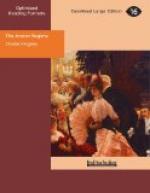The French people—says M. de Tocqueville—made, in 1789, the greatest effort which was ever made by any nation to cut, so to speak, their destiny in halves, and to separate by an abyss that which they had heretofore been, from that which they sought to become hereafter. But he had long thought that they had succeeded in this singular attempt much less than was supposed abroad; and less than they had at first supposed themselves. He was convinced that they had unconsciously retained, from the former state of society, most of the sentiments, the habits, and even the opinions, by means of which they had effected the destruction of that state of things; and that, without intending it, they had used its remains to rebuild the edifice of modern society. This is his thesis, and this he proves, it seems to me, incontestably by documentary evidence. Not only does he find habits which we suppose—or supposed till lately—to have died with the eighteenth century, still living and working, at least in France, in the nineteenth, but the new opinions which we look on usually as the special children of the nineteenth century, he shows to have been born in the eighteenth. France, he considers, is still at heart what the Ancien Regime made her.
He shows that the hatred of the ruling caste, the intense determination to gain and keep equality, even at the expense of liberty, had been long growing up, under those influences of which I spoke in my first lecture.
He shows, moreover, that the acquiescence in a centralised administration; the expectation that the government should do everything for the people, and nothing for themselves; the consequent loss of local liberties, local peculiarities; the helplessness of the towns and the parishes: and all which issued in making Paris France, and subjecting the whole of a vast country to the arbitrary dictates of a knot of despots in the capital, was not the fruit of the Revolution, but of the Ancien Regime which preceded it; and that Robespierre and his “Comite de Salut Public,” and commissioners sent forth to the four winds of heaven in bonnet rouge and carmagnole complete, to build up and pull down, according to their wicked will, were only handling, somewhat more roughly, the same wires which had been handled for several generations by the Comptroller-General and Council of State, with their provincial intendants.
“Do you know,” said Law to the Marquis d’Argenson, “that this kingdom of France is governed by thirty intendants? You have neither parliament, nor estates, nor governors. It is upon thirty masters of request, despatched into the provinces, that their evil or their good, their fertility or their sterility, entirely depend.”




